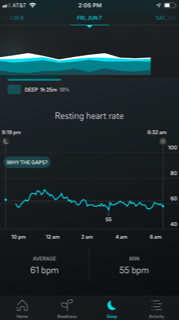Thoughtful Thursday…3 ways I’m improving my sleep and recovery...
- Lisa Schaffer
- Jun 12, 2019
- 5 min read

Welcome to Thoughtful Thursday. This GreenNote Fitness newsletter mindfully gathers and distills useful information that is supportive to our journey. It is my mission to educate, inspire, and propel you into action that moves you towards your goals and life of purpose. Take control of your journey today.
Recently I wrote a newsletter on how our resting heart rate plays a crucial role in our recovery. I track my sleep, recovery, resting heart rate (and more!) through a device called the Oura Ring which you can read more about here.
Through my self-quantification device I knew that my recovery was in the tank and had been for multiple days. Knowing that wasn’t good for my health, I’ve been working to improve that.
How?
In today’s newsletter we look at 3 ways I helped to improve my sleep and recovery.
Before we look at how I’m achieving better sleep and recovery, let’s delve deeper into the recovery measurement. The Oura Ring tracks recovery and provides a daily score called the Readiness Score. Your Readiness Score is a measure designed to help you identify days that are ideal for challenging yourself, and those that are better for taking it easy. The score is generated using all of the sensor data, physiological signals, sleep and activity patterns that are monitored by the ring.
Oura Ring has six factors that contribute to the Readiness Score:
Previous Night- how you slept last night can have a significant impact on your readiness to perform during the day
Sleep Balance- shows if the sleep you’ve been getting over the past two weeks is in balance with your needs
Previous Day- your level of physical activity yesterday is one of the key contributors to your readiness score...an exceptionally high amount of inactivity or activity leads to a drop in your readiness score. If your readiness is low due to intense training and increased activity burn, taking time to recover can pay off as improved fitness
Activity Balance- measures how your activity level over the past days is affecting your readiness to perform. When your activity is optimal, it means that you’ve been active, but kept from training at your maximum capacity
Body Temperature- Oura tracks the variations of your body temperature by measuring your skin temperature each night. Oura compares your skin temperature to similar measures from your earlier nights to estimate your normal range
Resting Heart Rate- is the number of times your heart beats per minute when you’re at rest. It’s a good measure of your recovery status, and an important contributor to your readiness...An exceptionally high or low resting heart rate is a sign is a sign of increased need for recovery. An intense training day, a late night workout, elevated body temperature, or a heavy meal just before bed can keep your resting heart rate elevated during the night, often resulting to a lowered readiness score
Recovery Index- measures how long it takes for your resting heart rate to stabilize. Late meals, late workouts, alcohol or sickness can keep your heart rate elevated and delay your recovery. The earlier your heart rate stabilizes during the night, the more time your body has to recharge and prepare for the next day. A sign of very good recovery is that your resting heart rate lowers during the first half of the night, at least 6 hours before you wake up
As discussed in the recent newsletter, I was concerned with my elevated heart rate over multiple days which indicated I’m overdoing it and not recovering. Here is what my resting heart rate looked like.

As you can see, not only that it was elevated, when it did lower it was very late. This doesn’t give the body proper time to recharge and prepare for the next day.
A few days later, I was able to improve my Readiness Score to “Ready and recharged”. Resting heart rate lowered sooner than it previously had. Here is the improvement .

Let’s look at what I did to improve my score.
#1. Awareness of level of recovery
Before looking at my self-quantification data each morning, I’ve done my meditation, breath work and visualization and yoga and gratitude practice. So I’ve already “checked-in” with how my mind and body are doing. After that I then check my sleep and recovery data. The numbers in the data showed my elevated heart rate so I “officially” knew I wasn’t recovered. Not just for one day but over the course of several days so I knew I needed to make some changes. This awareness helped me to do that.
#2. Lowered body temperature
Thermoregulation strongly influences your body’s sleep cycles. As sleep expert and author of Sleep Smarter, Shawn Stevenson explains,"When it’s time for your body to rest, there is an automatic drop in your core body temperature to help initiate sleep. If the temperature in your environment stays too high, then it can be a bit of a physiological challenge for your body to get into the ideal state for restful sleep. Studies have found that the ideal room temperature for sleep is around 68 degrees Fahrenheit. Anything above 75 or below 54 will likely cause some difficulty sleeping." Knowing that a cool bedroom has a positive impact on sleep, I adjusted the vents to make it cooler.
#3. Magnesium lotion
Looking at what I could do to sleep and recover better, I remembered I needed to revisit my use of magnesium. “Magnesium is a certified anti-stress mineral. It helps to balance blood sugar, optimizes circulation and blood pressure, relax tense muscles, reduce pain, and calms the nervous system…and getting your magnesium levels up can almost instantly reduce your body’s stress load and improve your quality of sleep.”
From Sleep Smarter, Stevenson recommends placing the magnesium lotion, 1.) on any muscles that are sore, 2.) in the center of your chest (a major position aligned with your heart - one of the most magnesium-dependent organs in your body - and your thymus gland - one of the major regulators of your immune system, 3.) around your neck and shoulders (where many people carry a lot of their stress).
The brand I use is Ancient Minerals
Note that this is a work in progress and there isn’t necessarily one thing that will help with sleep and recovery but rather a host of things. I needed to get back to basics to improve my sleep and recovery and will keep working at it to get back more to my baseline. Sleep and recovery are so important for health and well being. It should not be overlooked, in fact, it should be made a priority.
How are you sleeping? How is your recovery? Are you charged and ready to go?
Enjoy your journey,
Lisa Schaffer
You wouldn’t happen to know just one person that would benefit from this information? Please forward it to them!
Did you miss last week’s newsletter on A surprising factor for recovery and good health…?


















































コメント